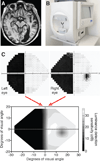Relearning to See in Cortical Blindness
- PMID: 26659828
- PMCID: PMC4795973
- DOI: 10.1177/1073858415621035
Relearning to See in Cortical Blindness
Erratum in
-
Corrigendum.Neuroscientist. 2016 Apr;22(2):213. doi: 10.1177/1073858415626325. Epub 2016 Jan 6. Neuroscientist. 2016. PMID: 26740082
Abstract
The incidence of cortically induced blindness is increasing as our population ages. The major cause of cortically induced blindness is stroke affecting the primary visual cortex. While the impact of this form of vision loss is devastating to quality of life, the development of principled, effective rehabilitation strategies for this condition lags far behind those used to treat motor stroke victims. Here we summarize recent developments in the still emerging field of visual restitution therapy, and compare the relative effectiveness of different approaches. We also draw insights into the properties of recovered vision, its limitations and likely neural substrates. We hope that these insights will guide future research and bring us closer to the goal of providing much-needed rehabilitation solutions for this patient population.
Keywords: V1; perceptual learning; stroke; vision loss; vision rehabilitation.
© The Author(s) 2015.
Figures



References
-
- Azzopardi P, Cowey A. Motion discrimination in cortically blind patients. Brain. 2001;124:30–46. - PubMed
-
- Bach-Y-Rita P. Controlling variables eliminates hemianopia rehabilitation results. Behavioural and Brain Sciences. 1983;6:448.
-
- Barbur JL, Harlow AJ, Weiskrantz L. Spatial and temporal response properties of residual vision in a case of hemianopia. Philosophical Transactions of the Royal Society of London - Series B: Biological Sciences. 1994;343:157–166. - PubMed
-
- Barbur JL, Watson JDG, Frackowiak RSJ, Zeki S. Conscious visual perception without V1. Brain. 1993;116(Part 6):1293–1302. - PubMed
-
- Bergsma DP, Elshout JA, van der Wildt GJ, van den Berg AV. Transfer effects of training-induced visual field recovery in patients with chronic stroke. Topics in Stroke Rehabilitation. 2012;19(3):212–225. - PubMed
Publication types
MeSH terms
Grants and funding
LinkOut - more resources
Full Text Sources
Other Literature Sources
Medical

